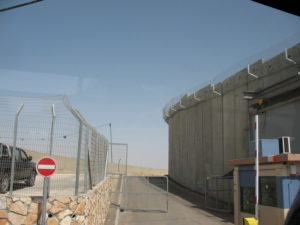Human Rights Watch, a nongovernmental organization, published a report on April 27 called “A Threshold Crossed: Israeli Authorities and the Crimes of Apartheid and Persecution.”
At more than 200 pages, the report details the ways in which “Israeli authorities methodically privilege Jewish Israelis and discriminate against Palestinians,” concluding that the Israeli government’s “intent to maintain the domination of Jewish Israelis over Palestinians across Israel and the OPT [Occupied Palestinian Territories]… coupled with systematic oppression of Palestinians and inhumane acts committed against them” amounts to “the crime of apartheid.”
It is a charge that the Israeli government denies with vigor and has denied since it first was leveled against the state in the 1970s.
Mark Regev, an adviser to outgoing Prime Minister Benjamin Netanyahu, denied the charge and cast aspersions on HRW itself, telling The New York Times that, “The mendacious apartheid slur is indicative of an organization that has been plagued for years by systemic anti-Israel bias.”

Apartheid, and whether it is an accurate description of the Israeli government’s policy toward Palestinians living under its control, is a frequent topic of correspondence from Jewish Exponent readers. And for good reason: It is a grave charge, freighted with history and sometimes complicated by countercharges of antisemitism toward those who would make it.
During the recent fighting between the Israel Defense Forces and Hamas, as well as the skirmishes between civilians over the evictions in Sheikh Jarrah, the charge of apartheid was made loudly once more and countered with the same volume. But in notes from our readers arguing either side, it became clear that few appear to have an accurate idea of what actually constitutes apartheid.
So what it is apartheid? How is it defined legally? When did critics of Israel begin to describe their actions as apartheid, and why? Which actions by the Israeli government are critics referring to today when they use the term apartheid? And what do the people who deny the charge present as the exculpatory evidence?
Prior to the development of a legal definition, apartheid was a policy of segregation and resource distribution in South Africa. It was intended to ensure white South Africans could dominate a country in which they were a minority. The term “apartheid” was developed by Afrikaner clergy as “a moral project to preserve, protect and uplift the Afrikaner nation,” said David Gordon, a professor of history at Bowdoin College.
The Afrikaners were white South Africans, typically of Dutch descent. Apartheid “was vaguely defined by a political party commission prior to the election in 1948, when the Nationalist Party, headed by one of these clergy, came to power using ‘apartheid’ as an election slogan,” Gordon added. What it would come to mean in reality took more time to work out.
Apartheid, instituted in 1948, inaugurated a system of segregation that deprived many Black South Africans of citizenship, barred them from marrying white South Africans and gave the state power to evict millions of them from their homes. Other non-Afrikaner racial groups were discriminated against, as well.
A system of racial classification helped the state to keep non-Afrikaners from using the same public facilities or attending the same social events as their Afrikaner countrymen. It restricted job opportunities, housing, education and movement within the country. Internal repression of dissidents could be brutal. And though the system was eventually dismantled, the legacy of apartheid remains.
Apartheid, according to Ian Lustick, a professor at the University of Pennsylvania, was given a legal definition outside the bounds of South Africa in 1973. The UN General Assembly promulgated “The International Convention on the Suppression and Punishment of the Crime of Apartheid,” which defined apartheid as “inhuman acts committed for the purpose of establishing and maintaining domination by one racial group of persons over any other racial group of persons and systematically oppressing them.”
Those “inhuman acts” included actions like “legislative measures and other measures calculated to prevent a racial group or groups from participation in the political, social, economic and cultural life of the country,” as well as internal suppression of dissidents, ghettoization and land expropriation. This was intended, in part, to define apartheid as not only a crime against its victims, but against humanity.
In 2002, the International Criminal Court issued the “Rome Statute,” defining “the crime of apartheid” as “inhumane acts … committed in the context of an institutionalized regime of systematic oppression and domination by one racial group over any other racial group or groups and committed with the intention of maintaining that regime.”
So what does this have to do with Israel?
According to Asaf Romirowsky, executive director of Scholars for Peace in the Middle East and a fellow at the Philadelphia-based Middle East Forum, applying the term “apartheid” to Israeli policy toward Palestinians “speaks to the lack of understanding and the lack of education, or understanding, of what is actually happening on the ground in Israel.” The push to charge Israel with apartheid, he said, has its roots in Palestinian Liberation Organization propaganda campaigns in the early 1970s, and has become the bedrock accusation of the boycott, divestment and sanctions movement.
“If you fast forward from that understanding into the use of media, and then the use of social media, and the rapidness of what happened now in Gaza, it is no surprise that every group out there, Jewish and non-Jewish, are accusing Israel of ethnic cleansing and apartheid,” Romirowsky said.
He believes that the inclusion of Ra’am, an Islamist party, in the new Israeli government, “factually debunks apartheid altogether.” Romirowsky’s position, that Israel is not committing the crime of apartheid, is shared by Israel and the U.S. State Department.
Lustick did not take the same view.
For a time after the 1967 war, most of the world, he said, accepted that Israel ruled over Palestinians in the West Bank and Gaza Strip in a manner consistent with international law. “But with the extensive processes of land expropriation and settlement,” Lustick said, “including the transfer of almost one-tenth of all Israeli Jews across the Green Line, and with declarations by Israeli leaders that Israel will never withdraw and never allow Palestinian independence, the control of those areas, and of their populations (who have no political rights in Israel) have increasingly and legitimately been understood as a consolidating regime of systematic discrimination against Palestinian Arabs in favor of Jewish Israelis.”
In Lustick’s view, and that of some independent NGOs and think tanks in Israel and abroad, the actions of the Israeli government constitute the crime of apartheid.
[email protected]; 215-832-0740






